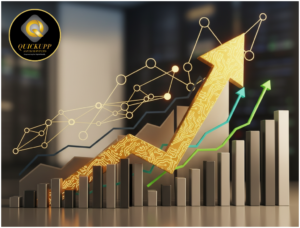In the span of just a few decades, Artificial Intelligence (AI) has transformed from science fiction into science fact. What was once considered the domain of futuristic novels is now driving cars, diagnosing diseases, writing code, and even composing music. As we stand on the brink of a technological revolution, it’s becoming increasingly clear—AI is the future.
A Quiet Revolution
AI is already embedded in our daily lives. Every time you ask Siri for the weather, get a recommendation on Netflix, or use Google Maps to avoid traffic, AI is working behind the scenes. These small conveniences are just the tip of the iceberg. Industries like healthcare, finance, education, and manufacturing are undergoing massive transformations thanks to machine learning, natural language processing, and neural networks.
Why AI Matters
The real power of AI lies in its ability to analyze vast amounts of data and make decisions faster—and often more accurately—than humans. In healthcare, AI models are being trained to detect diseases like cancer in their earliest stages, potentially saving millions of lives. In agriculture, AI is optimizing crop yields by predicting weather patterns and soil health. In education, personalized learning platforms are adapting to each student’s needs in real time.
The Economic Shift
AI is also poised to reshape the global economy. According to a PwC report, AI could contribute up to $15.7 trillion to the global economy by 2030. While some jobs will be displaced, new roles requiring AI literacy and ethical oversight will emerge. The key lies in preparing the workforce for this transition through upskilling and continuous learning.
The Ethical Imperative
As we charge ahead, ethical questions about privacy, bias, surveillance, and job displacement must be addressed. Who is responsible when an autonomous car crashes? How do we ensure AI systems are fair and transparent? These aren’t just technical challenges—they’re moral ones, and solving them will require collaboration across governments, tech companies, and communities.
What the Future Holds
Looking forward, AI will continue to evolve in ways we can barely imagine today. From solving climate change to unlocking new scientific discoveries, AI has the potential to be a powerful tool for good. But with great power comes great responsibility. It’s up to us to shape how AI is developed and deployed—to ensure that it benefits all of humanity.
Conclusion
AI is not just a trend—it’s a transformative force that’s redefining the boundaries of what’s possible. As we move deeper into the 21st century, embracing AI responsibly and intelligently will be crucial. Whether you’re a developer, a business owner, a student, or a policymaker, one thing is clear: AI is the future—and the future starts now.
Let me know if you’d like a version tailored to a specific audience—like students, professionals, or entrepreneurs—or if you’d like to add visuals or references!



